Correlation between Employment Quality and Skill Training of Land-expropriated Farmers
School of Management, Henan University of Technology, Zhengzhou 450001, China
1 Introduction
Skill training, as an essential human capital investment method, is as important as formal education, and realization of human capital needs supplement and conversion through training[1]. Training is the foundation of employment. Strengthening skill training of land-expropriated farmers is favorable for helping them to find a proper job in cities, so as to realize benign interaction with urbanization development. Therefore, it is an objective requirement for land-expropriated farmers to realize non-agricultural employment and obtain citizenship through skill training. According to the theory of human capital, the human capital is heterogeneous. In other words, difference in human capital determines variation in ability level. Li Zhongmin divided the ability into basic ability, specialized knowledge and skill, organization management and coordination ability, and resource allocation ability, corresponding to general type, skill type, management type, and enterpriser type human capital[2]. The detail is illustrated in Fig. 1.
There is a complementarity between stock level of human capital and skill training. With higher educational level and certain work experience, land-expropriated farmers will understand and grasp skills instructed better, so as to manifest higher productivity[3]. In this survey, most land-expropriated farmers have low educational level, and the stock of human capital is low. They belong to general type human capital. Due to low ability, they will have greater difficulty in urban employment process. To increase the stock of human capital and improve human capital, land-expropriated farmers have to participate in skill training. Three is a strong correlation between skill level and employment quality of land-expropriated farmers. Land-expropriated farmers with different skill level have enormous differences in employment opportunity, employment industry, employment ability, wage income, and employment stability. Skill training can effectively improve employment quality of land-expropriated farmers.
2 Correlation between employment quality and skill training
2.1DatasourceData in this study came from our questionnaire of field survey. In July to August, 2015, we carried out a field survey using simple random sampling and stratified sampling, supplemented with field interview. We organized postgraduates of School of Management, Henan University of Technology to conduct questionnaire survey and field interview in 20 villages of 5 towns in suburbs of Zhengzhou City. We distributed 600 copies and received 558 copies of questionnaire (536 copies were acceptable). The valid response rate was 89.3%. Detailed items of the questionnaire are listed in Table 1.
According to survey results, there are 330 men and 206 women, accounting for 61.6% and 38.4% respectively. Besides, 81.3% farmers are married, and 18.7% are unmarried. The average family labor is 1.96. Our field interview and questionnaire indicate that the income of most families still mainly comes from migrant work. Land-expropriated farmers in our survey are mainly 40 and 50 years old; educational level iss mainly junior and senior middle school; most of them are married and engaged in building, housekeeping, and restaurant service industries.

① General ability; ② Ability of performing certain work; ③ Organization and management ability; ④ Resource allocation ability
Fig.1Typeofhumancapital
Table1Basicsituationofland-expropriatedfarmerssurveyed

SexQuantityofsamplesAgeQuantityofsamplesMaritalstatusQuantityofsamplesEducationallevelPercentageIndustryQuantityofsamplesMale33018-30yearsold89Unmarried98Primaryschoolandbelow9.2Industrialmanufacturing64Female20631-40yearsold105Married436Juniormiddleschool75.8Buildingindustry28641-60yearsold342OthersSeniormiddleschoolorspecialsecondaryschool14.6Serviceindustry157Total536Total536Total536Collegeandabove0.4Autonomousundertaking29Total100Total536
2.2RelationbetweenskilltrainingandemploymentopportunityNon-agricultural labor skills of land-expropriated farmers directly influences the probability of their employment. In labor market, enterprises like to recruit skilled labors to save training costs. Therefore, skilled labors have advantages in obtaining employment information and channels. According to our survey, employment training and social insurance are major issues cared about by land-expropriated farmers. Land-expropriated farmers face difficulty of employment and survival. Considering their sustainable livelihood in cities, they hope to receive skill training.
Table2Mainconcernsofland-expropriatedfarmers

MainconcernsSocialinsuranceTrainingandemploymentHousingMinimumlivingsecurityHouseholdregistrationPercentage∥%2636131510
Vocational skills of land-expropriated farmers directly influence their employment in cities. Constant upgrade of industrialization and modernization lays down higher requirement for vocational skill quality of land-expropriated farmers. Farmers with professional skills will be easier to find jobs in cities. There is a benign interaction mechanism between skill training and employment opportunity of land-expropriated farmers, as shown in Fig. 2. The direct effect of skill training is improvement in employment ability. According to our survey, labor skill is a prerequisite for smooth employment of land-expropriated farmers especially in formal sectors. From understanding of land-expropriated farmers about training effect, land-expropriated farmers have fully realized the importance of receiving skill training. About 71.5% land-expropriated farmers believe that participation in skill training is helpful for finding jobs. From the perspective of the desire for receiving skill training, land-expropriated farmers want to improve their employment, living and development ability in cities through receiving training and education. About 55.93% land-expropriated farmers have high demands for skill training and are willing to participate in skill training. Therefore, land-expropriated farmers have high expectation for skill training. In skill training and professional qualification certification of land-expropriated farmers, successful skill training is a key for land-expropriated farmers to smoothly enter the corresponding industry.
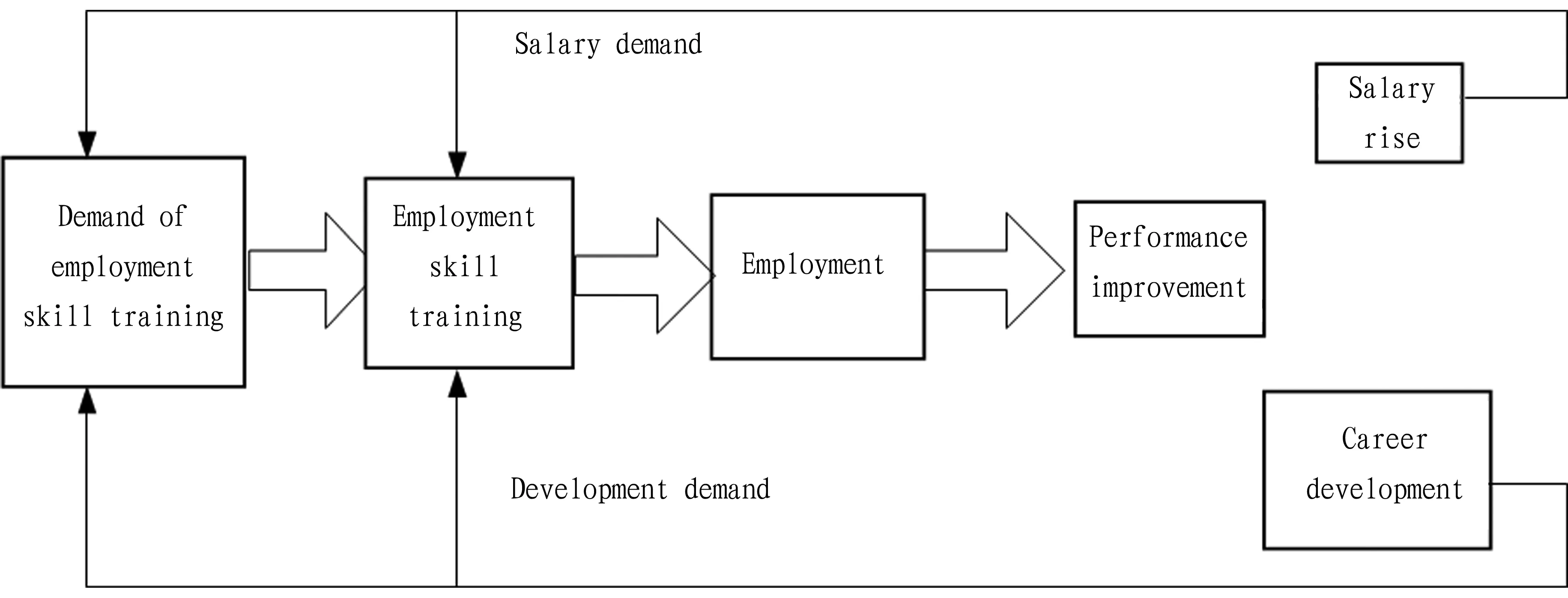
Fig.2Benigninteractionbetweenemploymentskilltrainingandemploymentopportunity
Investment in skill training for land-expropriated farmers can directly improve their employment ability, and help them to promptly obtain or issue employment information. This is an important condition for land-expropriated farmers to find jobs in cities. At present, land-expropriated farmers find jobs in cities mainly through introduction of relatives and friends. It is difficult for them to obtain employment information. However, land-expropriated farmers with higher human capital can obtain, analyze and judge employment information, find proper jobs in a short period, which will greatly reduce job-hunting costs and default risks. Therefore, training of land-expropriated farmers directly concerns their employment. Related surveys and studies of domestic scholars have also proved this conclusion[4]. According to our survey, only 1/10 land-expropriated farmers have obtained professional qualification or professional title certificate. Employment of land-expropriated farmers indicates that skill training exerts a significant influence on employment of land-expropriated farmers. For example, those land-expropriated farmers having received skill training are easier to start an undertaking or find jobs in state-own institutions or enterprises. For land-expropriated farmers with low non-agricultural employment ability and without receiving skill training, it is difficult to satisfy demand of high labor skills in labor market.
2.3RelationbetweenskilltrainingandemploymentindustrySkill level of labors directly concerns their employment industry. Now, most land-expropriated farmers are engaged in building, traffic and transportation, manufacturing, and catering industries. These industries have poor working environment, low wage return, low technology content, and lack stability. Unemployment of land-expropriated farmers is also manifested as structural unemployment, which is largely because land-expropriated farmers lack non-agricultural employment skills. In this situation, it is urgent to strengthen skill training of land-expropriated farmers[5]. According to our survey, land-expropriated farmers face two barriers to employment in cities, namely, education barrier and system barrier. Due to low educational level and lack of specialized technology training and learning, land-expropriated farmers have to work in dirty and hard industries such as building or catering, and fail to directly enter enterprises and institutions with high technology content. Skill training is an essential means for increasing the stock of human capital of land-expropriated farmers. The level of training degree directly determines their jobs. Our survey indicates that those land-expropriated farmers having received skill training are easier to get jobs in enterprise with three kinds of capital and state-owned institutions and enterprises[4]. Our survey indicates that land-expropriated farmers in Zhengzhou suburbs are mainly engaged in wholesale, retailing, catering, manufacturing, and building industries which have relatively low requirements for labor skills, belong to physical labor industry, and have relatively low technology content. For those industries with high technology content, such as education, culture and art, radio, film and television, finance, insurance and other industries with high specialization, land-expropriated farmers are difficult to adapt to demands of these industries[6]. According to our survey, educational level of land-expropriated farmers is mainly junior and senior middle school, accounting for 49.19% and 29.27% of total samples. Their training is mainly oriented towards building decoration, accommodation and catering, hairdressing and beauty, and house keeping industries. Such training is difficult to adapt to demands of industries with requiring high skills. These fully reflect that there is high correlation between industries of land-expropriated farmers and the training they have received. After receiving excellent skill training, land-expropriated farmers will have high labor skills and can be engaged in industries with high technology content. Labor skills directly influence profession distribution of workers. There is a significant connection between profession distribution and labor skills of land-expropriated farmers. Skill training of land-expropriated farmers affects improvement of the quality of their labor skills.
Table2Influenceoftrainingexperienceonprofessiondistributionofland-expropriatedfarmers
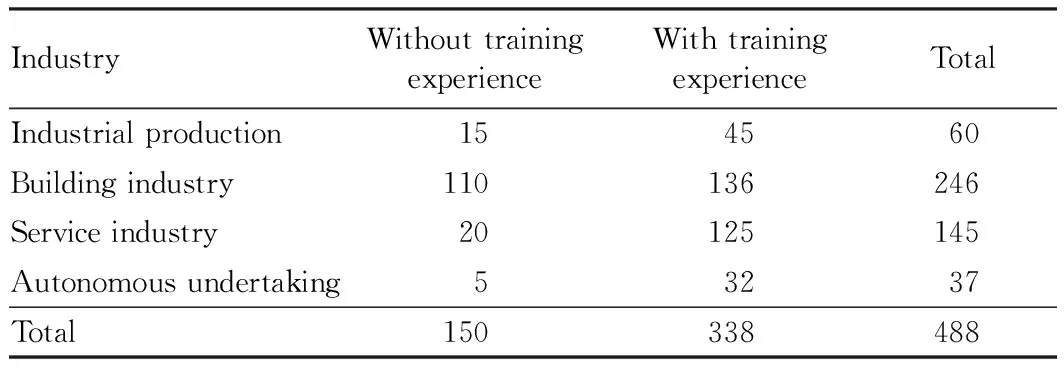
IndustryWithouttrainingexperienceWithtrainingexperienceTotalIndustrialproduction154560Buildingindustry110136246Serviceindustry20125145Autonomousundertaking53237Total150338488
According to overall situation of profession distribution, no matter for any profession, land-expropriated farmers with training experience have greater advantages than those without training experience. From the perspective of technicians, there is a small gap in training experience promoting land-expropriated farmers to become technicians. As to land-expropriated farmers becoming production workers, there is a big gap in training experience promoting land-expropriated farmers to become production workers. Those land-expropriated farmers without training experience mainly become production workers. This is highly connected with the fact that most farmers are engaged in building and manufacturing industries because these industries require relatively low skills. In the aspect of farmers becoming service workers of the tertiary industry, training experience brings a big gap for land-expropriated farmers becoming service workers of the tertiary industry. Because modern service industry has higher and higher requirements for labor skills, necessary training should be received before entering this industry. Compared with labors without receiving skill training, the skill training increases near 6 percentage points for promoting employment of land-expropriated farmers in service industry, while it increases as high as 21 percentage points for boosting employment of land-expropriated farmers in industrial production department[7].
2.4RelationbetweenskilltrainingandemploymentabilitySkill training is an essential part of human capital investment of land-expropriated farmers. Under the premise of physical health and certain educational level, land-expropriated farmers should have certain skills for participating in economic activities. Acquisition of such ability is mainly realized through vocational (practical skill) training. Developed countries such as Japan and Germany attach great importance to improving vocational skills of workers. No matter public sectors of government, private organizations, various enterprises, and employees, all have a complete set of vocational skill training system[8].
Skill training of land-expropriated farmers directly concerns their employment quality, while the employment quality directly influences the possibility of their participation in higher level skill training. Generally, the employment quality is assessed mainly through job availability, working condition, safety and health, right and dignity, welfare and security, training and career prospect, and employment status[9]. Low educational level, little training investment, and imperfect labor training market lead to low efficiency of land-expropriated farmers participating in skill training. These are mainly manifested in job availability. Land-expropriated farmers have difficulty in finding proper jobs. As to working conditions, most land-expropriated farmers are engaged in industries with low technology content, long labor time and poor working conditions. Compared with urban residents, their working conditions are worse. From the perspective of safety and health, land-expropriated farmers face risk of unemployment at any time and the safety of their workplace is low. From the aspect of training and career prospect, it is difficult for land-expropriated farmers to obtain opportunity of skill training. In respect of employment status, it is difficult for land-expropriated farmers to negotiate matters with employers on the basis of equality, and difficult to participate in social dialogue and organization decision making through the trade union.
2.5RelationbetweenskilltrainingandwageincomeSkill training, as an important type of investment of human capital, will directly influence income level of labors. In order to become real citizens and obtain the same employment opportunity and income level as urban residents, land-expropriated farmers have to be provided with similar education and vocational skills. According to our survey, most land-expropriated farmers have low educational level and poor non-agricultural employment skills. It is urgent for them to receive pertinent skill training. Vocational skills of land-expropriated farmers directly influence their income level. Vocational skills are essential requirement for labors in current situations of industrialization and modernization. With vocational skills, land-expropriated farmers can stand out in intense market competition and obtain high income. Our survey indicates that about 57.35% land-expropriated farmers have realized the importance of skill training and necessity of skill training for increasing their income. In our survey, after receiving skill training, about 86.81% land-expropriated farmers realized income growth, while only 13.19% farmers failed to realize income growth. From Fig. 3, it can be seen that, 44.69% (122) land-expropriated farmers have income growth of 0-300 yuan; 29.96% (77) land-expropriated farmers have income growth of 301-600 yuan; 20.25% (48) land-expropriated farmers have income growth of 601-900 yuan; 6.96% (19) land-expropriated farmers have income growth of 901-1200 yuan; 2.56% (7) land-expropriated farmers have income growth of more than 1200 yuan.
These reflect that training experience exerts a significant influence on income growth of land-expropriated farmers. In other words, skill training can increase income level of land-expropriated farmers and is favorable for non-agricultural employment transfer of land-expropriated farmers. Content of skill training is wide, hierarchical, pertinent and highly practical. Thus, skill training plays a great role in promoting land-expropriated farmers to set up citizen awareness. It is helpful for improving employment quality of land-expropriated farmers in cities and thus skill training can effectively increase income of land-expropriated farmers. By contrast, those land-expropriated farmers without receiving skill training will have relatively narrow employment channel and lack support of employment skills. In addition to backward market competition awareness, land-expropriated farmers will get frustrated in urban labor market. Our survey indicates that employment skill training has better promotion for growth of employment rate and wage income of land-expropriated farmers. The employment rate of land-expropriated farmers having received skill training is about 30% higher than that of those having not received skill training, and the income of land-expropriated farmers having received skill training is also 20% higher than that of those having not received skill training.
2.6RelationbetweenskilltrainingandemploymentstabilitySkill training of land-expropriated farmers exerts a great effect on their employment stability. From Table 4, we can see that after receiving skill training, the work duration of land-expropriated farmers becomes long. In other words, skill training can increase the employment stability of land-expropriated farmers. In our survey, after receiving skill training, about 45% land-expropriated farmers realized long time of employment stability. This reveals that skill training plays a positive role in promoting employment of land expropriated farmers. Therefore, it is necessary to strengthen skill training of land-expropriated farmers.
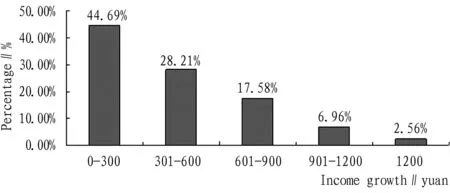
Fig.3Incomegrowthofland-expropriatedfarmersafterreceivingskilltraining
Table4Comparisonofworkdurationbeforeandafterreceivingskilltraining

Workdurationofland-expropriatedfarmersBeforereceivingskilltrainingNumberofpeoplePercentage∥%AfterreceivingskilltrainingNumberofpeoplePercentage∥%1-3months3813.9282.934-6months6724.543412.457-9months7326.744616.8510-12months4516.488631.50Longerthan1year2910.625821.25Longerthan2years217.684115.02Total273100273100
In sum, receiving skill training is the basis of land-expropriated farmers smoothly getting jobs in cities. Through implementing planned, organized, pertinent, and practical skill training, it is expected to raise the employment ability of land-expropriated farmers, so as to effectively help them to find jobs in cities and become real citizens. The equilibrium return rate of human capital investment and marginal income ratio not merely determine the investment amount, and the management system and operating mechanism of such investment are also considerably important[10]. In the process of employment of land-expropriated farmers in cities, it is recommended to strengthen skill training, raise their employment ability and income creation ability. Skill training is not only helpful for increasing wage income of land-expropriated farmers, but also favorable for satisfying labor demands of enterprises and requirements of industrial structural upgrade for skillful personnel.
3 Conclusions
According to our survey, land-expropriated farmers need to improve their employment ability to smoothly get jobs in cities and really become citizens. Improvement of employment ability lies mainly in increase in stock of human capital of land-expropriated farmers. Skill training can help land-expropriated farmers to increase the stock of human capital. It is necessary to establish an appropriate training mode with land-expropriated farmers, government departments and land expropriation units as subjects. In this study, we put forward the mode of skill training promoting employment quality. Skill training can raise human resource level of land-expropriated farmers, and increase their labor and employment skills, to help them realize regular employment and smoothly become real citizens. This mode can be illustrated by Fig. 4.
In the context of new urbanization, it is necessary to help land-expropriated farmers to realize their non-agricultural employment through providing skill training for them. For fund sources for skill training, with reference to the rate of extra charges of education funds for enterprises, it is feasible to withdraw 2% from land grant as funds for skill training of land-expropriated farmers. Besides, government and land expropriation unit should bring into play active role in the process of promoting skill training. And skill training should be undertaken under the guidance of government and support of land expropriation unit.
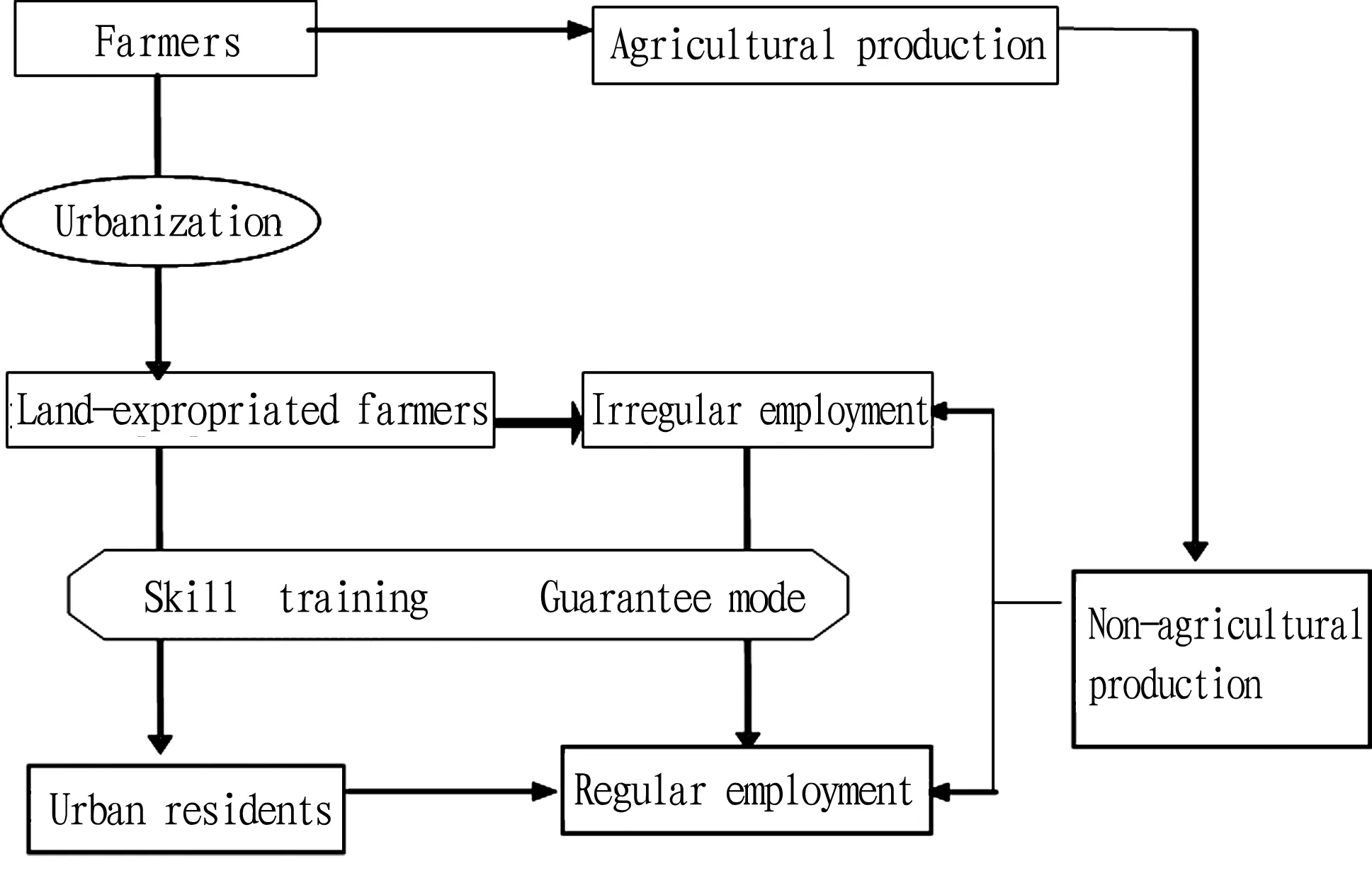
Fig.4Themodeofskilltrainingpromotingemploymentquality
[1] ZHAO YD, WANG FY.What is influencing economic status attainment of Chinese rural-urban floating population [J]. Chinese Journal of Population Science,2002(4):10-17. (in Chinese).
[2] LI ZM. Human capital——The interpretation of a theoretical framework to some problems of China[M]. Beijing: Economic Science Press,2010: 34-36. (in Chinese).
[3] WANG XG, CHEN H. Analysis on the influencing factors of the employment quality of land-lost farmers[J]. Urban Problems,2014(1):63-70. (in Chinese).
[4] ZHOU YX, CUI YP. Analysis on the correlation between the education degree of rural labor force and employment as well as family income[J]. Chinese Rural Economy,2011(4):60-67.(in Chinese).
[5] WANG DW, ZHANG ZX, CHENG J,etal. Effect of financial crisis on the transfer of rural labor in poverty-stricken areas[J]. Chinese Rural Economy,2012(9): 21-27. (in Chinese).
[6] WANG XG. Evaluation on employment quality of land-lost farmers——Taking the case of Zhengzhou City[J]. Urban Problems,2015(7):71-77.(in Chinese).
[7] YAO XG. The occupational categorization of farmer laborers and human capital restriction[J]. Journal of Zhejiang University(Humanities and Social Sciences),2009(5): 16-22. (in Chinese).
[8] MARTIN C. The great work dilemma:Education,employment and wages in the new global economy[J]. Economics of Education Review,1997, 16(3): 247-254.
[9] LI JF. Study on Chinese informal employment[M]. Zhengzhou: He’nan People’s Publishing House,2015: 93. (in Chinese).
[10] [USA]HOWARD S. Reforming traditional agriculture[M]. LIANG XM (Translator), Beijing: The Commercial Press,1999: 43. (in Chinese).
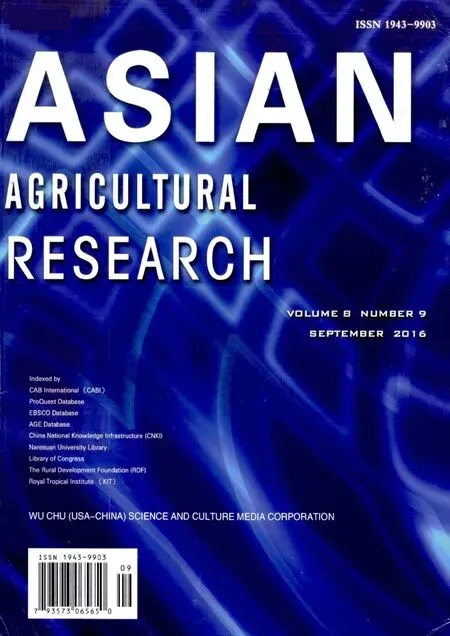 Asian Agricultural Research2016年9期
Asian Agricultural Research2016年9期
- Asian Agricultural Research的其它文章
- Empirical Study on the Relationship between Organizational Flexibility and Performance of Agricultural Enterprise
- A Study on Spatial Distribution of Commercial Housing Prices in Xiangtan City
- Design and Experiment of Fluid Dynamic Ultrasonic Water Aerator
- The Relation between Age Structure of Population and Resident Consumption Based on Endogenous Growth Theory
- Effect of Different Pretreatments on Explosion Puffing Drying of Hami Melon at Modified Temperature and Pressure in Xinjiang
- Design and Implementation of National Meteorological Service Platform
